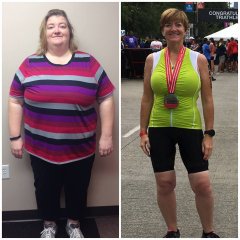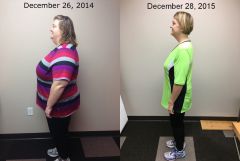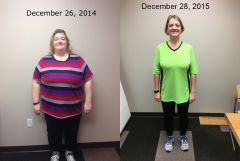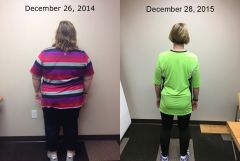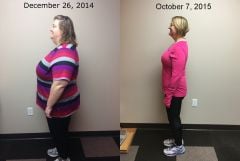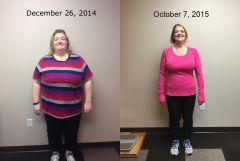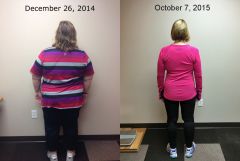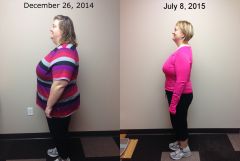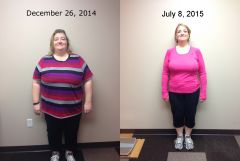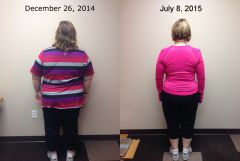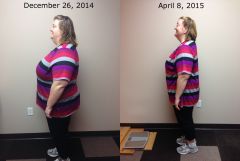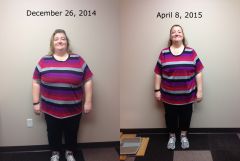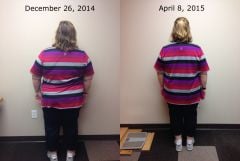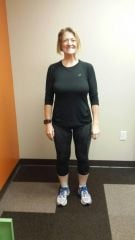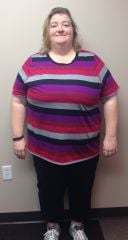-
Content Count
717 -
Joined
-
Last visited
Content Type
Profiles
Forums
Gallery
Blogs
Store
WLS Magazine
Podcasts
Everything posted by anaxila
-
-

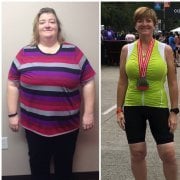
Almost 3 years out...why still high protein and low carb?
anaxila replied to ForLfKlovr's topic in WLS Veteran's Forum
I’m about 3.5 years post-surgery, and I don’t follow the Bariatric diet at all. I became very active (swimming, biking, running) after surgery and my food intake was all wrong for my athletic performance and training needs. So I switched over from a Bariatric nutritionist to a sports nutritionist and never felt better. It’s important to balance your macronutrients to fit your activity level, watch your caloric intake, monitor your weight, yadda yadda. But no, you don’t need to eat like a new patient forever. -
You probably need a ton more carbs than you're getting. That's what's so interesting about switching from a bariatrics eater to an athletic eater. Your lack of carbs may be part of the problem.
-
Talk to a dietician. Not a bariatrics specialist: a sports specialist who works with athletes. He or she can help you understand your fat/muscle mix and how you need to fuel yourself for your activities. Switching my allegiance from bariatrics to sports made all the difference to me and was pivotal to understanding what my ideal weight actually was and how to maintain it and an active lifestyle.
-


Surgeon says go ahead.. do I take the bite? Or wait?
anaxila replied to BrandiceLeSha's topic in Plastic & Reconstructive Surgery
Do it. If both your doc and the plastic surgeon agree that you're ready, I wouldn't hesitate. I didn't wait the full recommended period post-bypass either, because I had lost all of my excess weight and was in good shape. I haven't regretted it for even a second. -

28468385_10213988124089871_5550121156020698925_n.jpg
anaxila posted a gallery image in Member Photo Gallery
From the album: Progress Pictures
Two weeks before gastric bypass, compared to finish line of olympic-distance triathlon 21 months later. -


Is this price outrageous? (NYC!)
anaxila replied to TheFormerFatGirl's topic in Plastic & Reconstructive Surgery
For comparison's sake, I had two major plastic surgeries. 1) Brachioplasty (arms) and abdominoplasty (belly from hip to hip and up the middle). 2) Thigh lift (inside the leg from knee to groin and then along crease to outside of hip, ) with the completion of a circumferential body (backside, from hip to hip connecting abdominoplasty). These were done in day surgery (no overnight stay) and cost me $25k all in. However... I live in Wisconsin, about 40 minutes outside of Milwaukee. Still, I had to pay 100% out of pocket and I cried when I got the estimate because I thought I'd never be able to justify it. But my husband said we'd find a way and he's a miracle worker so it happened. Best money I ever spent. -
This is a really difficult topic, and something I struggled with three years ago this month when I was 90 days away from RNY. The simple truth is that you'll need to tell everyone eventually. It will be obvious when you start losing weight that something is causing it, and since rapid weight loss can be caused by cancer and other serious health problems, it's better if everyone understands that it's a *good* thing when they see it happening. The key is *how* you do this, not *whether* you do it. You don't have to shout it from the mountaintop to all and sundry, and you don't have to bare your soul to neighbors and acquaintances that ask how you've done it. Even three years later, while I'm pretty open about everything I've done (I've been on the evening news, for goodness' sake), I still consider the source of the inquiry when deciding how much to share. The most important element to successfully navigating these conversations is how you approach them. You've made your decision. You've done the research. You've read all the horror stories and wonder stories and come down somewhere in the middle. You've worked with a competent medical team over the course of many months to arrive at this place. Believe in your process, be confident in that decision, and communicate that confidence to those who love you. My parents were completely blindsided by my decision. My weight was NOT something I was willing to discuss with them, ever. And I could tell my mother was dying to undermine and question me. But I communicated my decision and my reasons and made it clear she was being informed - not consulted - and the moment passed. I would have loved to have more people on my side beforehand, and to be able to communicate my concerns, fears, apprehensions, and take comfort from my loved ones... but I knew it would be counterproductive to ask her to be that person. I relied on this group and my local support group to get me through my own fears, and let everyone else in after the fact. Hope this helps.
-
Food was always my coping mechanism too. No one could be more surprised than me to learn that exercise is the most unbelievably effective way to burn off the crazy. I know, right? I always thought that exercise was about my body, but it turns out it's actually about my mind. Good luck finding what works best for you!
-
I had RNY and I donate blood and platelets all the time. No exclusions, no worries. Good luck!
-


4 months out, how many calories
anaxila replied to WeepingAngel0587's topic in Gastric Bypass Surgery Forums
When I was 4 months out, I was eating about 1000-1200 calories per day and working out (burning about 500-600 calories) about 4 times per week. Your calorie intake should reflect your activity level, so you should definitely take it up a notch if you're getting good exercise. -
It's fine. Do what you have to do to get the food down, just don't overdo it.
-
Oh, and as for your question about how much weight you'll have lost by then... it is SO variable from person to person that it's hard to tell. That was a big concern for me too, and I obsessed about it like a crazy person before I left. I am 5'4" and weighed 305 pre-surgery. By the time I went to Peru I'd lost about 70 pounds. I seem to recall that was faster than my doc expected, but I was MOTIVATED. Your flight experience could still be uncomfortable but not undoable. As you board, ask the flight attendants for a seat belt extension and they should be able to get it to you discretely. I traveled a lot at 300+ and it wasn't ever my favorite thing but I survived. You will too, and there are better days ahead!
-
I took a 2-week bucket list trip to Peru with my mother (her bucket list, not mine) just 3.5 months after RNY. I was also nervous but everything turned out great. I was really feeling the boost to my energy from shedding early weight, and I didn't have any trouble with the unfamiliar and exotic diet I was consuming. I brought a lot of protein bars just in case, and recommend having as much emergency / backup / "just in case" food as possible, just to be on the safe side. You'll have a great time!
-
Take all the horror stories with a grain of salt, remembering that people who've had a hard time are the ones most in need of support. Those of us with smooth sailing tend to be the quickest to get out of the support cycle, so we are probably underrepresented in the grand scheme of things. I had gastric bypass in January 2015 when I was 44 years old, 5'4" and 305 lbs. I currently weigh 145, which blows my mind every day. I have run a half marathon, two triathlons, and about four dozen 5Ks, whereas before surgery I couldn't run half a block to catch the bus. I said goodbye to high blood pressure, high cholesterol, diabetes, and sleep apnea. My life is different only in ways that are amazing and wonderful. I've never dumped, and only threw up a couple of times at the beginning when I ate too fast. It didn't take long to figure out how to avoid that. I never found foods I couldn't tolerate, but then I wasn't eating things that were bad for me anymore so go figure. The worst thing that happened to me was excess skin, which I addressed with two rounds of extensive but routine plastic surgery in November and January this year. My results may not be typical, but neither are the doom-and-gloom nightmare scenarios. Keep your chin up and take it all with a grain of salt.
-
I just registered a Milwaukee-area in-person support group through the site. Please follow the group so I can gauge interest and try to get the group off the ground. http://www.bariatricpal.com/chapters/15-milwaukee-area-local-bp-support-chapter/ Cheers!
-
From the album: anaxila
-
From the album: anaxila
-
Well, here's a new one for me. I was unable to donate platelets today because my blood pressure is too low. The woman at the Blood Center said this is the first time in 30 years that she's ever had to defer someone for LOW blood pressure. Considering that 2 years ago my blood pressure was continuing to rise despite the meds I was taking to lower it, I'll call it a victory even though I really wanted to donate today. I am coming back next week to try donating again, with strict instructions to booze it up the night before, eat a bunch of salty foods, don't exercise that morning, and guzzle two cups of coffee before my appointment. My, how my life has changed. ????
-
I will echo the advice to start with a personal trainer and/or organized strength classes. Women on Weights programs are good, as is Body Pump. You may not like the first one you try - or may have trouble mastering the moves and changes - but keep trying until you find something you like.
-


Calling all fitness buffs! Newbie here....
anaxila replied to funky_monkey800's topic in Fitness & Exercise
I second all the advice to start some strength training. If you work out at at gym (which I'm guessing you do with Insanity... which is an INSANE program!), then I strongly recommend hooking up with a personal training. It can be expensive, but SO worth it. Also, see what strength classes your gym has. Mine has Body Pump, which I absolutely adore. I do it 3x/week and have muscle definition like I never thought I'd see. It's not the only program out there and it's not for everyone, so test the waters until you find something you like. -
Congratulations on your amazing progress! You should be SO proud of yourself! I am in a similar quandary, and am meeting with a new nutritionist next week to get some guidance. I work out hard (triathlon and strength training) a minimum of 6 days per week, and twice per day on most days. I take in about 1000-1300 calories per day, and my target split is 30% Protein, 35% fat, 35% carbs. I had surgery 14 months ago and I'm just 1.8 pounds away from my goal, but feel like I'm overdue for switching from bariatric-weight-loss mode of eating into athlete-fueling mode. I tried to talk this through with the nutritionist on my bariatric team and she didn't have a clue how to advise me. Thus, I'm meeting with a sports nutritionist next Thursday. I'll let you know what I learn!
-
I'm coming up on my first surgiversary next week and will have a more substantial progress report then. But in the meantime, I've updated my progress picture album with the latest and greatest. I've taken pictures each quarter, so you'll see 3-month, 6-month, 9-month, and finally 12-month updates. Life is pretty great.
-
From the album: Progress Pictures


